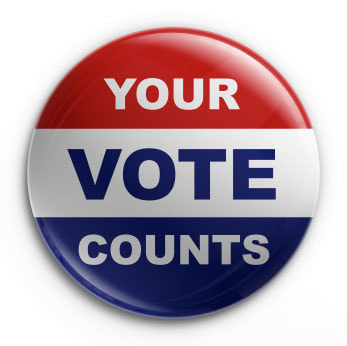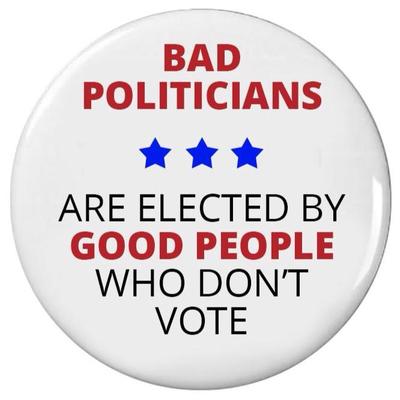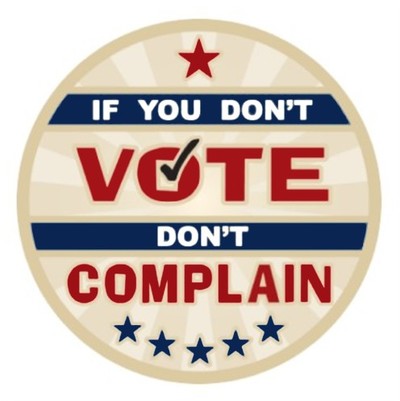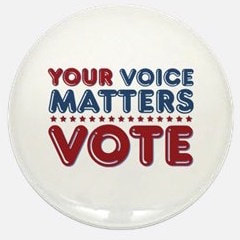|
With a state election coming up May 8 and statistics historically showing low voter turnout in our region (and many states), I’ve been wondering why people vote—or don’t. I had my suspicions, but wanting to understand without judgment, I reached out to ask the question.
Nationwide, people answered. A strong contingent of “from day one voters” answered and shared their experiences; some accounts were deeply moving. A handful of non-voters also chimed in as well as some later-in-life voters. While it’s clear by the numbers many citizens don’t vote, I only heard from four in this category. Comments ran the gamut: they hate politics, distrust candidates and feel they fuel their own self-interests, don’t have an opinion, aren’t confident in knowing who to vote for, feel they are too busy with their lives to get involved or investigate, or believe their vote won’t make a difference. Some voters came on board as they matured, coming to believe voting was their civic and moral obligation. Others, after being told not to complain if they didn’t vote, were activated to show up at the polls. The majority who responded to my query were avid voters. I was impressed that young to old, these folks have voted from the moment they could legally do so. They reported chomping at the bit to vote, as well as their kids once they reached 18. Many were raised by parents and grandparents who imparted just how important it was to exercise this right. One respondent wrote, “My parents would tell stories about their experiences with Jim Crow and what it took for blacks just registering to vote…the risks, dangers, intimidation and violence. I would see videos about how blacks were treated: the poll tax, hosed down with high-pressure water, attacked by dogs, arrested, chased and beaten. It was shocking to know that while I had a relatively pedestrian daily life, my parents and others before them had been routinely exposed to threats and violence for simply registering to vote let alone actual voting. It was never an option that I would not vote.” Females shared a historic perspective as well. One wrote, “My right to vote is one of the greatest privileges I value as an American woman. I vote for the women who didn’t have this right 100 years ago. That the 19th Amendment was only passed in 1919 is tough to comprehend, given the loud voice I have in today’s America. It’s my right and civic duty to do so, and every time I do, even in the smallest decisions, I’m left with a tremendous sense of pride. It feels like I’m carrying a torch for the suffragists who must not ever be forgotten. Every woman should understand our history and exercise this tremendous power.” Another wrote about a pivotal moment: “I became interested in the political agendas back in the 1960s. With the Vietnam War raging, the protests all over the country and everyone watching on TV, I thought it necessary to stay informed. Voting became an issue as soon as I turned 21. I have not missed the chance to vote since then. Many things have changed, but I still feel that being informed and voting is crucial to the stability and continuance of our great democracy.” This comment spoke to being heard: “I don’t believe in voting party lines. I don’t care if I live in a ‘blue’ state that will perpetually elect Democrats for president or in Congress. My voice is still heard. They are always looking at statistics, crunching numbers, voter turnout, etc. My vote is counted. I count. My opinion counts.” I was not a voter early on. I was raised in a metropolis, apolitical and voting was the furthest thing from my mind. It wasn’t until I moved to Charles Town and realized I knew people serving at the city and county level that I began to pay attention. Living in a small town, I have learned how important it is to vote at the local level, where those politics impact my life more than the national variety most of the time. I have also witnessed community races won (or lost) by one vote, illustrating the weighty significance of how each vote matters. I am disappointed in many of West Virginia’s public servants and believe they’ve done a disservice to citizens. I will be using my vote as my voice in this primary. Elections for non-partisan judicial and school board candidates are also decided in this election. I know several people running so I’ve been doing my homework to be an informed voter. It doesn’t take much. Ask a friend their opinion. Attend a forum. Go online and read. Then vote. It’s your voice. Be heard! This article appeared in The Journal on Sunday, April 8. Comments used to inform column about why people vote or abstain The following comments were edited only for typos. “I’ve always voted. Since I could remember. My parents came out of the Deep South (Memphis and East Birmingham), Mom and Sad respectively… where Jim Crow was essentially de facto slavery, sanctioned because the government refused to force states to abide by federal and state law protecting citizens rights. Bull Connor wasn’t that far from my Dad’s home nor was the Edmund-Pettus Bridge. Amazing this happened in my lifetime!? I learned in school the difference between democratic countries (choice) and countries without democracy (no choice and no freedoms). The difference, always, that defined democracy against autocracy, was the right to vote with free and fair elections. My parents would tell stories about their experiences with Jim Crow and what it took — the risks — for blacks just registering to vote; the dangers, the intimidation and the violence. I would see videos about how blacks were treated: the poll tax, hosed down with high-pressure water, attacked by dogs, arrested, chased and beaten. It was shocking to know that while my address was Oakland, CA, that I had a relatively pedestrian daily life, my parents (living in the same house) and others before them and me, had been routinely exposed to threats and violence for simply registering to vote let alone actual voting. I could walk down an idyllic street, be pleasantly greeted and encouraged to be there to vote but I knew — in a crystal clear way — that many, many others before me had a vastly different experience. It was NEVER an option that I would not vote. I have always voted. I have rarely tried to convinced people of who they should vote for but I have always advocated that people HAVE to vote. I vote. Simple as that…every election. EVERY election.” “I registered to vote the first time I could. I’m a registered Democrat who does not vote party lines. I don’t believe in voting party lines, especially when it comes to judges or local officials. I have voted for Republican presidents and Democratic presidents. In truth, had John McCain not chosen Sarah Palin as his running mate, I would have strongly considered him for our commander in chief. The right to vote was only afforded to women in 1920. That’s 98 years ago, which frankly, is not that long ago. There are plenty of women alive today who remember when their mothers couldn’t vote. Does it make a difference? It does to me. It is about my voice. I am not neglecting my civil duty that was hard fought to gain. I don’t care if I live in a “blue” state that will perpetually elect Democrats for president or in Congress. My voice is still heard. They are always looking at statistics, crunching numbers, voter turnout, etc. MY VOTE IS COUNTED. I COUNT. MY OPINION COUNTS. My choice for a particular candidate may not win, but the pollsters and politicians all see the lists of who voted, and they know I was one of them. More importantly, I know I was one of them. My children know how important it is to me to be an active voter. They can’t wait to vote. They usually come with me to the polling location at their former preschool to watch. There are people in other countries who are not allowed to vote. Worse yet, the polls are so rigged (interference as of late notwithstanding) that there really is no hope of a fair process. But we still have integrity. Voting equals power. I always will be a voter, even when my signature is reduced to an X.” “I had the opportunity to ask my son last night about voting. I already knew that he was not registered to vote. I have encouraged him to register and vote in recent elections but he has not done so. I asked why this was the case. He said that he did not feel well enough informed to vote (that part seemed responsible at least). I asked why that was and was told that he didn’t watch the news, etc. so was not informed and contributing to that, he wasn’t really that interested!! I registered when I turned 18 and voted the first time that I could. I have voted in most elections since. Although I have to admit that I do miss some primaries and some “less important” voting opportunities. I think part of that is due to logistics for voting and commuting. But I do try to vote as much as possible. Quite frankly, sometimes state primary type elections are not well publicized. Anyway, no excuses. I will say that I have learned from some of our local elections that it does matter if you vote. In one of our local elections an individual lost by 1 vote!! I did vote in that election and I voted for the person that lost. At least I knew that I did my part as best I could. You ask about feeling jaded. Even though I do vote I am still jaded about it. Probably just a personality flaw. Nonetheless, I continue to vote because the alternative of not voting is even worse.” “I sort of remember that I was excited about being able to vote for the first time…I remember that I was temporarily staying at my mother’s house in St. Louis before starting off to my first real job after graduating from college in California and was diligent about reading all the info in the newspapers to try to find out just what to do. And then I voted and was very pleased! I have been voting ever since then, wherever we lived…west to east and north to south and I never skip doing it. Love being part of something so important!!!!!! And I always read the materials that come in the mail and info from the daily newspapers and then try to do my best.” “The first time I was eligible to vote in a presidential election (JFK), I did. I have voted in every election since then. Even though for many years I was registered Democrat I didn’t always vote that way. I have never voted a straight party ticket except when it happened to work that way. From the beginning I tried to pay attention to the issues and the person. California’s voter pamphlets were always a great starting point, especially for hot button issues. I’ve always thought that “down ballot” candidates were important too. Sometimes I refrained from a vote where I didn’t have enough information or in the case of an issue was hopelessly confused. Have I regrets about some choices I made? Yes! Was it ever about a candidate I voted for who didn’t win? No! When I moved here I didn’t vote for local candidates and issues right away because I had no context and information. Same thing in Oregon although by the time I left I was donating to candidates the county level. One of the fundamentally important rights in our process is the secret ballot. The Russian interference with our system is a danger that cannot be overstated. If people feel their vote will be subverted and therefore don’t protect it, then this country is lost. Even though we didn’t talk politics when I was growing up, or ever, my mother was very clear about the importance of voting. Just like getting a job, getting married, having children, it was a given. Growing up in Orange County there were newspapers and radio that were very conservative. That probably influenced me to push back against it. Certainly felt outrage and disgust at some of it. I could point out that gangs, radical groups, cults know the prime times to harvest members. As for parenting, I doubt we did more than tell our kids voting was important. But they may have observed us doing studying up and talking about election matters.” “I never see a candidate worthy of the office they are running for. I wouldn't trust them if they told me the sky is blue and water is wet. It seems to me that whenever they get around to actually doing anything, 9 times out of 10 it’s in their own self-interest not ours. I was always taught our government was supposed to be of the people and serve in the best interest of the common citizen, but politicians seem to come from a small select demographic and cater to their own. I think the idea of our government is a good one it just didn't happen. This is based on the terrible education they provided me with so I might be wrong.” “To tell you the truth, I really can’t remember voting until my children were toddlers. I don’t think I was too interested in issues before then. Of course now it’s very different, with 24 hours of news each day and all the time in the world, I vote all the time. Regular elections, special elections, school and local elections!” “I started voting when I turned 18, and it has been a good experience but not a very dramatic one, if that makes sense. It feels good to be a part of things and feel as if you have a voice, however I view it as a duty and something that I am grateful we are able to participate in.” “I used to listen to the stories from my grandfather. Those who came before me fought too hard...for me to piss it away and not vote. I have voted since the age of 18. I talked about voting with kiddo for the first time last year.” “I’ve always been on the school of thought that it’s my civic duty as an American citizen. My vote does matter. And I also feel that if you didn’t vote, you have no right to complain good or bad, about the outcome. You have excluded yourself from that right. I did not too long ago read a post that said someone didn’t vote and that gave them the right to complain because they take no fault in the outcome. I had never thought of it that way, but I still stand by my opinion. It’s our duty. It’s our right. It’s what you do.” “I would have considered myself A-political until John Kerry threw his hat in several years ago. I just didn't care, didn't think voting mattered. That and my husband would always tell me that I can't complain unless I vote. So, I voted for the first time. Also, maturing and learning that it is my moral and civil obligation to vote. Not voting is a slap in the face to all those who strove for freedom.” “I was raised to believe that voting was the price for living in a democracy. I've raised my kids to understand that voting is their civic duty. I still remember standing in line at age 18 to cast my very first vote. That being said, I've come to view abstaining as a form of civic protest. The past several elections have clearly showed us that we do not vote for the best candidate, but for the lesser of two evils. So why should one vote when he or she does not support the nominated candidates? I respect and understand this position; however, I still vote, every time.” “I turned 18 the day after election day (obviously a little while ago!). I was able to vote and haven't missed an election since. My family has served in the armed forces since America was formed, and I owe it to them and to my children to help create a country to be proud of!” “I vote because I’m a woman and our fore sisters fought for my right to have my voice heard. I vote because I’m an American and do not take the right to vote for granted. It’s a very emotional thing for me, and I cry prideful tears every time.” “My right to vote is one of the greatest privileges I value as an American woman. I vote for the women who didn’t have this right 100 years ago. That the 19th amendment was only passed in 1919 is tough to comprehend, given the loud voice I have in today’s America. It’s my right and civic duty to do so, and every time I do, even in the smallest decisions, I’m left with a tremendous sense of pride. It feels like I’m carrying a torch for the suffragists who must not ever be forgotten. Every woman should understand our history and exercise this tremendous power. And I should add that I’ve not felt as if I shouldn’t vote or that my vote doesn’t count, particularly when the outcome isn’t favored to go my way. I understand the way our system of government (and voting) works and do not feel disenfranchised in that process of democracy.” “A friend sent an article which encouraged the reader to reevaluate inconvenience. Our lives are so convenient, but we lose much in the process. Voting is probably one of the casualties. We don't want to wait in lines to vote—it's inconvenient.” “I have to agree with inconvenience being a factor in this day of instant gratification. I started voting when I was 20. The teachers in school taught us how fortunate we were to be able to have a say in our government. My father and mother, my relatives and neighbors always voted. It was an important obligation as a citizen of this country. With freedom there does come responsibility. Have I become disenchanted? Many times. I still go to the polls to vote hoping maybe, just maybe, we'll get politicians who care about the country as a whole. In Congress today we have the Black Caucus, Hispanic Caucus, Women's Caucus, and probably the Gender Identity group. All looking out for their special interests and no one working together. Sixty-two years after I cast my first vote, I'll still keep voting and keep hoping.” “I vote. You should talk to my daughter. She turns 18 in July, plans to vote in November, and is frustrated to be ineligible for the May primary. Of course, she's been raised being dragged to candidate meet and greets and the courthouse/city hall on election nights, so it's not surprising she is ready and eager to become part of the process as an actual voter. I am also proud that she does not always share the views of her father and me. She listens to us, but also follows the issues and forms her own opinions.” “I don't vote. Sorry ladies. Partly because I don't have an opinion. I hate politics, I feel like my one vote won't make a difference, and I always have kids or too busy anyway.” “I believe in informed voting and that the local politicians matter. Moving around the country several times, and landing on new ground in a voting season often, has made that very difficult. National elections and school tax voting are usually no brainers, meaning that it is simple enough to know your candidates and positions and know which choice you would make. State, county and smaller locale elections are much more difficult. We typically rely on newspapers and candidates' websites to provide relevant information or abstain. I have several other tidbits for you regarding absentee ballots and hospital or military absences that you may find interesting. There are several times we are simply not able to vote. The situations are outrageous and sadly, common. “I became interested in the political agendas back in the 1960s. With the Vietnam War raging, the protests all over the country and everyone watching on TV, some for the first time, I thought it necessary to stay informed. Voting became an issue as soon as I turned 21. I have not missed the chance to vote since then. I feel that no matter where you stand on the issues, if you don’t vote, you can’t complain. Many things have changed from then to now, but I still feel that being informed and voting is crucial to the stability and continuance of our great democracy.” “I’ve always voted even when I lived in Sweden or was deployed overseas via absentee ballot. It is the price of entry to be an American, otherwise it’s stealing.” “I came from a country where voting was compulsory. One of my main reasons for becoming a USA citizen was so that I could vote. I could have stayed a permanent resident with no major detriments but it was the desire to participate in the choice of governance in the country that I had chosen to live in and was giving me a living. I can tell you if I had not been bought up in a compulsory to vote country, I probably would have said screw politics, but because you knew that everyone sitting at the dinner table actually had voted, everyone in your workplace, everyone on public transport, it made you take more of an interest and be more educated at the polling station. The worst thing that happened to the American political system was the legality of PACS. It bought corporate money back into a legal contribution. I know that in some countries, election campaigns are funded by the people to minimize only the rich being able to run for office — not sure how it rolls anymore, definitely doesn’t happen in the USA! “The day I turned 21 (the old days, when you had to be 21 to vote or drink), I dressed up and walked to town hall in my small (25,000 people) New Jersey suburb. I was nervous. I went up to the clerk's window and asked how I should register to vote. She passed me a form on a small cardboard card, I filled it out, waited while she typed up my voter's card, and went home with it in my purse feeling like an adult for the first time.” “I have never voted. I'm so embarrassed about it I won't comment on your thread. I don't have any compelling reason other than I never got around to it. I was not interested in politics at all as a young person. I was busy working and raising my daughter. In the last election I was so turned off to both candidates and we were traveling on Election Day that I just couldn't be bothered with the hassle of voting early. And this election also proved that the popular vote doesn't matter so who knows if I'll ever vote. I am embarrassed by it though and only have a few close friends that know.” “I am 62 years old and have voted I think in every election since I was old enough to do so. I remember thinking that it was really cool to be able to finally vote and I am certain that in the late ’60s and early ’70s it was considered a privilege to do so. I know that my parents and grandmother (other grands were deceased) also voted in every election. I believe I went with the Republican ticket because that was what my parents and grandmother were. I clearly remember a discussion about this when my younger brother said that he was not registering as a Republican and my grandmother told him straight up... “I certainly hope you are not registering as a damned old Democrat,” to which my brother stated he was registering as a Independent. Unsure what the rest of the conversation was but I can still hear her voice saying this to my two-year younger brother. For a very long time, I just voted what I felt would be correct but I never really researched anyone. This went on until the early ’90s when I began to listen to Christ-centered talk radio. That is when I began researching all candidates to make sure that they were addressing my concerns as a Christ follower. I am deeply saddened by the mess that we call Washington, D.C. because I don't believe there are very many persons there that have a clue what this great country stood for when it was founded. Due to so many things no longer being taught in our schools, I feel certain that we are going to crash and burn just as so many civilizations have done before that fail to realize history is there for a reason. The morning after the 2008 elections knowing what my research had been about that administration, I literally was brokenhearted for my country. I am unsure that we will ever recover. I still vote and I still vote in my local elections also. Hope this will give you a little insight albeit it is just my thoughts.”
0 Comments
|
Summary
A collection of columns, articles and general a-musings. Archives
July 2024
|
Katherine Cobb





